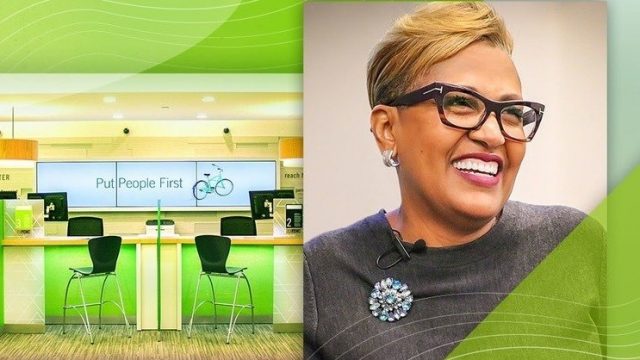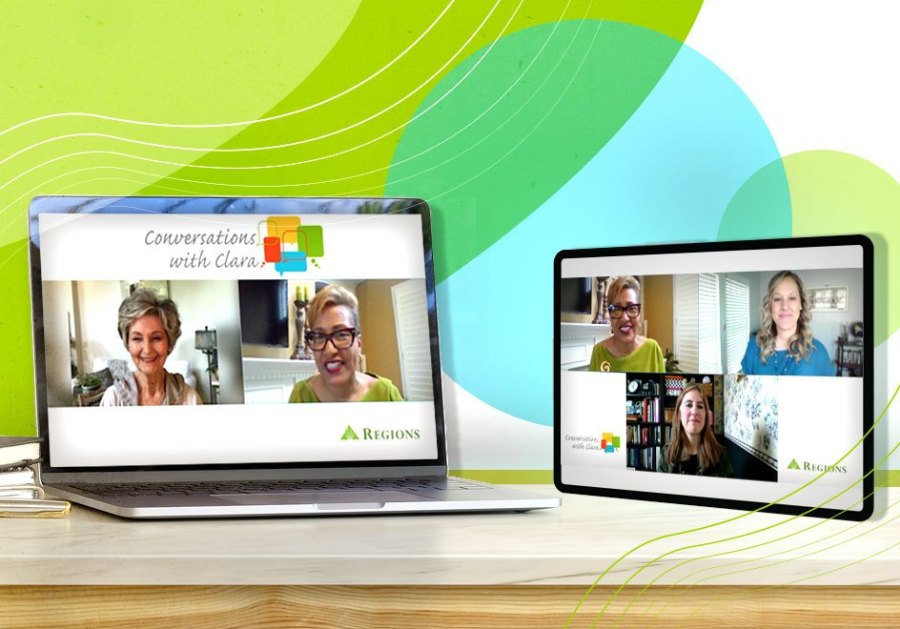
By Jeremy King
Regions Doing More Today
“Whatever you’re thinking, however you’re feeling, it’s going to be OK,” said Clara Green.
Offering reassurance and understanding, Green, the head of Diversity and Inclusion at Regions Bank, set the virtual stage for her most recent Conversations with Clara discussion. During normal times, the conversation series takes place in front of a packed auditorium at Regions’ Birmingham headquarters. Candid, forthright discussions examine a wide range of issues.
But these are far from normal times.
Even so, Green is building on Regions’ commitment to empower associates through information, dialogue and resources. While large, in-person meetings cannot take place, and at a time in which more than half of Regions associates are working from home, Green is making a video discussion available to all associates, encouraging them to prioritize their health, both physical and emotional.
With so many people worldwide staying at home and trying to find a new normal amid the COVID-19 pandemic, we thought we’d share three key takeaways from Green and her guests.
1) It’s normal to struggle. But there is help.
“There’s an old saying: It’s hard to make sense out of things that just don’t make sense. And that’s kind of where we are,” said Dr. Lita Clark, president of the Employee Assistance Program that Regions offers through American Behavioral. “We are feeling overwhelmed and overloaded and overextended. These are normal feelings during abnormal situations.”
Indeed, this is a time when people have essentially lost a sense of control. We’re not as free as we were to do certain things. We miss getting to go see the people we often turn to for comfort and support.
So what can we do with the anxiety and stress that such a time can bring?
“I think we have to refocus,” Clark advised. “I think we have to be in the moment – not be concerned about what happened yesterday and not be worried about tomorrow.”
Rather, Clark encouraged people to recognize what they can and cannot control. She advised people against dwelling on when this will end; instead, look for positives that have emerged.
At the same time, recognize when it’s time to talk to a professional. Counselors have shifted from in-person appointments to virtual discussions, and confidential help can be as close as a call or click away. Reaching out to the resources around you can give you perspective and help you pull through.
Regarding the pandemic, Clark offered some words of comfort.
“We know it’s going to be resolved,” she affirmed. “We don’t know when. But we know it’s going to get better.”

2) New, healthy routines can be established.
Activities like exercising – and setting some boundaries – can be especially beneficial.
“If I don’t take care of myself, I won’t be available for my family and my friends,” Clark pointed out. “I’ve got to do things for myself here.”
So it’s not selfish; rather, it’s important for you, and for others, to focus on your own health.
In addition to making time for physical activity, pay attention to your eating habits while working from home.
“You’re normally not 20 feet away from all of your favorite foods,” pointed out Niki Bourque, Corporate Wellness administrator for Regions. “So instead of getting up and going to the coffee machine at work, now you’re going to the fridge, where all your snacks are. I think a good way to alleviate that is to pack your lunch as if you were going to the office, so you would only include the foods that you would bring to work. Then, you can better limit what you eat during the day.”
And think about where you’re logging in at home.
“Designate your work zone,” advised Tonja Dodd, senior Health Strategy analyst with Vitality Group, a personalized wellness platform Regions makes available to its associates. “Try your best not to have your work zone in your kitchen, where you’re tempted to eat and snack throughout the day.”
Also, consider how you budget your time when not working.
“Think about when you used to commute,” Dodd suggested. “A lot of times, that was kind of ‘your time.’ Think of that 20 minutes or half an hour, or whatever it was, and make it for yourself – whether it’s having a cup of coffee in the morning and reading or clearing your mind with a walk around the block.”
3) Talk to your children about what’s going on.
Anxiety and stress aren’t exclusive to adults. Speak with, and listen to, the younger members of your household.
“Children use us to understand the world,” Clark said. “So they’re watching us. They’re listening. They’re mimicking us. Don’t be afraid to talk to them about it.”
Age-appropriate discussions can help give them calm and perspective.
“You’ll want to talk about safety and what they can do to be safe,” Clark said. “And I think, most importantly, let them know we don’t have all the answers. And we don’t know of anybody who has all the answers right now. But be as positive as you can about this whole situation. We will get through it, and we’ll get through it together.”
Resources and perspective
There is no one answer that makes all the challenges we’re facing suddenly go away. But it can help to remember there are people – many people – who understand what you’re facing.
“We have a lot of great resources available to us, whether we’re in a pandemic or not,” Green said. “Taking the time to leverage those resources, and keeping perspective, can help us stay healthy for the longer term.”
This story originally appeared on Regions Bank’s Doing More Today website.
Additional Help Online
Mental Health America: Information on Anxiety and Other Challenges
American Psychological Association: Information and COVID-19 Resources
American Foundation for Suicide Prevention: Online Resources



